The Prime Minister is obviously a little … tipsy …
“Now this is the kind of music I can relate to.” Muldoon leers and chuckles, looking for all the world as if he’s making the final speech at a Hamilton RSA conversazione. He has just announced Patsy Riggir’s ‘Beautiful Lady’ as the winner of the 1983 NZ Music Awards’ most popular song category (the public vote one). His patronising tone would be irritating were it not for the fact that ‘Beautiful Lady’ has dislodged the night’s adjudged high rollers, DD Smash’s worthy but hardly exceptional ‘Outlook for Thursday’ and the aural Farex of Coconut Rough. Patsy is a like a cool breeze.
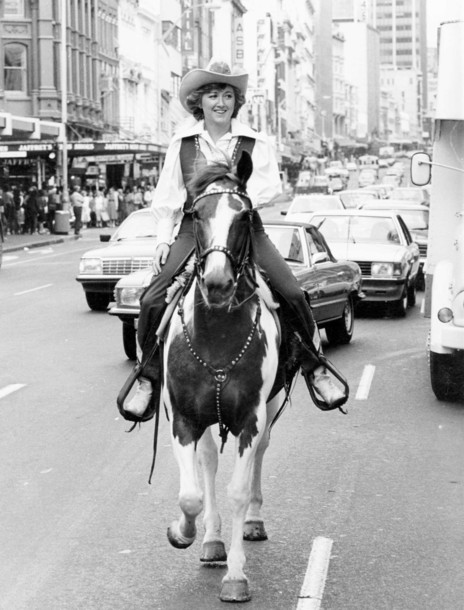
Patsy Riggir promoting the release of Lay Down Beside Me, Queen Street, Auckland, 1981
Earlier, she has been one of the few acts to dare to perform live at the awards, rather than simply miming to her record.
Patsy Riggir began singing country at age five and won two talent quests (one of which was run nationally) in her first year. But surprisingly, when it came time to go to school, singing was dropped altogether, and she did not perform again until 1973. Since then, there have been numerous awards of various stature and no little chart action.
She has just completed her third album, You’ll Never Take the Country Out Of Me. Patsy Riggir manages herself. And those who know say she does it very well.
--
How did you start singing country? It was a family tradition, wasn’t it?
Yes, it was. Dad had been singing for quite a while and when he married Mum, who was always an avid follower of country music, they started singing together. They did a lot, of broadcasts on 1ZH (then 1XH) in Hamilton and it sort of started from there.
Is country music strong in the Waikato? I always had the impression it was strongest in Southland.
It was – up until a couple of years ago. It goes right through now. I don’t think there’s any one area stronger than the others now.
Why do you think that’s happened?
It’s the general trend worldwide – the music wider acceptance of country music. It was very evident last year when I went to Fort Worth in Texas to the international country and western gala they held there. That involved 16 or 17 countries from all around the world.
Has the growth been a steady process or has there been a recent upsurge?
It’s been growing gradually but I think the last two years has seen a tremendous surge in the growth and the acceptance of it. It’s just flying through Europe, through Britain … even through Japan, it’s really big in Japan. You get all these wee Asian cowboys singing their songs in Japanese. You can’t understand the words, but you recognise the tunes!
So what’s the appeal of country music?
I guess everybody’s got their own philosophy on the growth in popularity but I like to think it’s due to the fact that the world has become so much faster – everyone’s going hell for leather, everyone’s totally tied up in getting from point A to point B in the shortest possible time. Jobs are becoming much more pressurised than they have ever been. And I think country music is just such a total contrast – it’s worlds away from life as we’re living it during the nine-to-five day. It’s the kind of music to which you can come home, kick your shoes off and say, “to hell with the world”.
You don’t have to get involved in it, it’s just a soothing kind of music.
Why do you think country music has always been so strong in this country?
Well, country music was associated with country people at first, because the very first, basic topics of a country song dealt with the country, with the trees and the prairies and the cactus and that type of thing. And of course, New Zealand has always been a pastoral country, and this was the kind of music the country people wanted to hear.
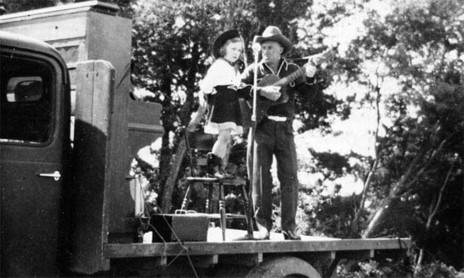
Patsy Riggir and her father Jack performing in the King Country during the early 1950s
Is there a special character to New Zealand country music?
Not really, no. We’re actually following the American type of country music. We’ve yet to really develop something ourselves in the way of country music because we’re such a new country. We haven’t been here long enough to develop a brand that can be identified as a New Zealand country music. The closest thing we’ve got is the song ‘Mackenzie and His Dog’, which is about Mackenzie, the sheep rustler. That’s the most well-known New Zealand country song that springs to mind. But it’s definitely growing because with a lot of the country music awards that go on annually around the country there are now sections encouraging amateur songwriters and of course you start to get people writing about New Zealand, things that are topical within New Zealand, its geography, its history.
Were you at all conscious of trying to put a New Zealand identity in your new album?
I’ve written some of the songs on it, including the title song but it’s not really topical to New Zealand. It’s topical to the world … of country music. And in that, I must admit, you can get away with a lot of things in a song that you couldn’t if you were just speaking your mind. You put it in a song and you can get away with hell.
That sounds interesting – what’s an example of it?
Well, as a country singer … and I have been country always. It’s never deviated. I enjoy most forms of music but country is my number one thing and there are a lot like me. And it hurts when I see established pop singers suddenly break into the country field, put a hat on and say they’re country singers. They’re not. I’ve seen a lot of this in the last two or three years. Because country today is a good place to be at, you’re finding a big swing. A lot of performers might not be making the grade in their pop or rock field and they’re starting to fall by the wayside because there are younger ones coming up and taking their place. So they stick a Stetson on and decide they’re suddenly going to jump on the country bandwagon and try and cash in. Because country is just booming – it’s a billion-dollar industry in the States and it’s fanning out all over the world. So I’ve got a sly dig at those people in my song.
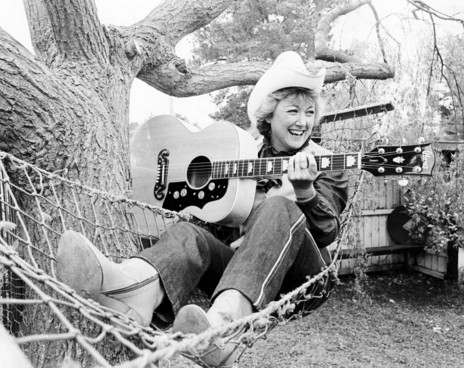
Patsy Riggir having just got the news she had been named NEBOA Entertainer of the Year, 1983
There’s also been a tendency for some country singers to shift towards pop or MOR …
Not so much as the other way. There might be the odd country artist who’s attempted to spread his wings or maybe gather in a few more fans by trying songs that are written to go up pop charts as well as country charts. But there are not many country artists I can think of who go so far over the line that they cease to sound country any more. They might just sneak across a little – like I’ve got one song on the new album which is quite unlike anything I’ve done before, it’s almost like a blues pop song. But it’s got a wee smidgeon of steel in there that just keeps it within the country boundary.
Do you think country music has to change to survive?
I think you can extend from that traditional base but I don’t really think it has to change to survive. It’s like a big circle – if you stay in one spot the world will go right round in a circle and come back to you. And that’s the way it’s happening with country music at the moment. Three years ago I had an awful struggle to get my first album because the record companies weren’t interested. They were totally ignorant. I’d been to the States and I could see how it was going to fan out, but there was no convincing record companies that that was the way it was going to go. They were totally wrapped up in rock and pop. People said to me, “You’re going to have to change, become a pop singer, if you want to do any good.” And that of course was the wrong thing to say to me. Bristles stood up on end and I thought, “Damn you – no one’s going to change me. I’ll stay exactly where I am, sooner or later things are going to swing right back to me.” And that’s what’s happened. And I haven’t changed a bit.
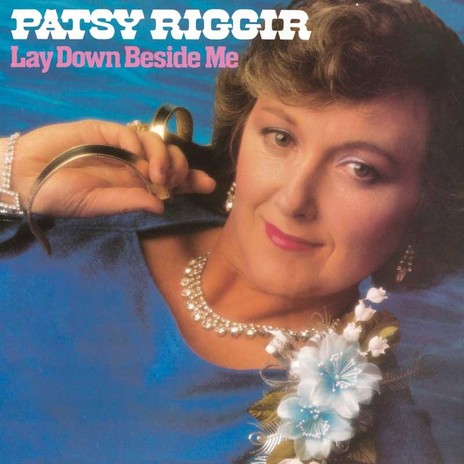
Lay Down Beside Me (CBS, 1981)
Your first album on CBS, Lay Down Beside Me was an undeniable success. Were you surprised at how well it did?
Yes I was, actually. Naturally I hoped it would go well but I didn’t quite realise it would hit the pop charts as well. The single got to No.3 on Ready to Roll, which is quite an achievement for a country song. And it was a very country song – it wasn’t as if it was a middle-of-the-road country-pop song.
Back to the start of your career. Why did you stop singing when you started school? Five years old seems a very early age to end an already promising career.
It was just one of those things. I became engrossed in school and I took up sport, which I loved. Singing was something I used to enjoy listening to but I was not interested in actually doing it myself. And it wasn’t until about 10 years ago that I decided I might like to get up and have another try. But there’s no real explanation as to why I stopped. Of course, I’m kicking myself now that I ever did. But of course, things have changed now and had I kept going it might not have worked out for me anyway.
What did you have in mind when you began singing again? A simple hobby?
Yes! I never dreamed it would get the way it has. In fact, if anyone had told me three years ago, when I left my job at the supermarket and took the plunge to see if I could make it professionally, what was in store for me in the next three years, I probably would have chickened out and stayed at the cabbage counter.
Your goals have obviously changed now.
Yes they have, totally. I’ve had to do a lot of thinking and readjusting in the last three years. Three years ago it was a hobby – doing it when I felt like doing it, which was occasionally. Now it’s a career and I do it because I have to.
Have you found the change a strain?
Yes. In fact, although I still love my music, a little bit of enjoyment has been lost along the way. It’s like anything – once you have to do it, regardless of how you feel, regardless of whether you’re as sick as a dog, whether you’ve got a splitting headache, whether the last thing you feel like is getting up on a stage and being sweet and polite to everyone when you feel like telling them were to go – it loses a wee bit of its enjoyment.
What are your goals now?
I’d like to get our product released overseas. It’s a challenge and a great lure to have the opportunity of recording in Nashville, and who knows, that may happen. But I’m a Kiwi and I’m very proud of the fact and rather than go over there and record, I’d like to have our product released over there. Because then it’s not just me who’s making it, it’s my recording studio, it’s my musicians, it’s my musical director, it’s my producer, it’s my engineers. It’s my team.
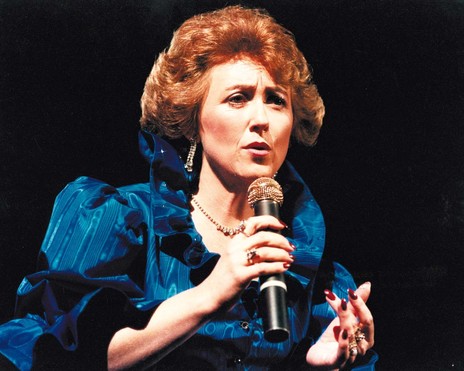
Patsy Riggir on the TV Special Patsy Riggir – Beautiful Lady, 1985
Can you see the day when your career will mean leaving New Zealand?
So far I haven’t had to. It’s worked out perfectly – I’ve been back and forth and that’s the way I’d like it to be. Because everyone needs a refuge and New Zealand and my home is mine. And if I can go over periodically and do a few months here and a few months there and come back to earth in New Zealand then I think I should be able to handle the situation fine. But if you go over and you’re on the road for 52 weeks a year then you’ll crumple.
The clothes you wear when you perform – where do they come from?
Well I used to make a lot of my own – I love sewing. But in the last 12 months that has just gone by the board. My sewing machine’s gathering cobwebs and rust and it needs a damn good clean. So I have to pick up outfits when and were I see them. But I don’t have time to spend in shops browsing so if I’m burning past a shop and I see something in the window and I think, “Well, if I put some sparkles on there and rearrange that and so on,” I have to rush in and grab it.
Is there anything in particular that you look for in clothes?
Something that looks chic, for a start. And something that looks feminine. Because all too often I think today’s women are losing that nice frilly feminine kind of appearance. But we’re all going to trousers and I’m happiest in jeans, so a lot of my stage outfits incorporate various sparkly tunic tops and satin trousers – because they are easy to wear, because they pack well and because they are so comfortably casual on stage.
What other considerations are there on the road?
Pacing yourself is all important. I’ve worked with musicians on the road for a fortnight at a time on tours and the second night out they might start to hit partying sessions. And you’re waiting in the van at 9 o’clock the next morning and they come down almost on their hands and knees and you think, “My God, how the hell am I going to get a note of music out of these guys tonight?” but somehow they manage to sort themselves out enough to get through the next show. But you’d think that first morning would be enough of a lesson to them but they just go and do it again. I learned very early on that if you want to give off your best and keep yourself in reasonable health you must pace yourself. You’ve got to know exactly how much you can have and when to stop and go up to bed. I think that’s one of the things that can kill artists in New Zealand, they just crucify themselves. I can’t understand it, it’s like a complete lack of self-discipline.
That’s not something that’s normally associated with country music, though?
No, it’s reasonably good … but then I’ve had to work with bands that weren’t really country. That’s another important thing, to suss out the availability of musicians who you know feel basically the same as you do yourself about music. If you take it seriously it’s treated seriously and self-discipline comes into that in a big way.
Oops, one more question. How, um, old are you?
Now Wayne, that’s not the sort of question you ask a lady, is it …?
No, and it doesn’t really matter.
--
From ChaCha, February 1984, and republished with permission of Wayne Washington, who is better known as Russell Brown.